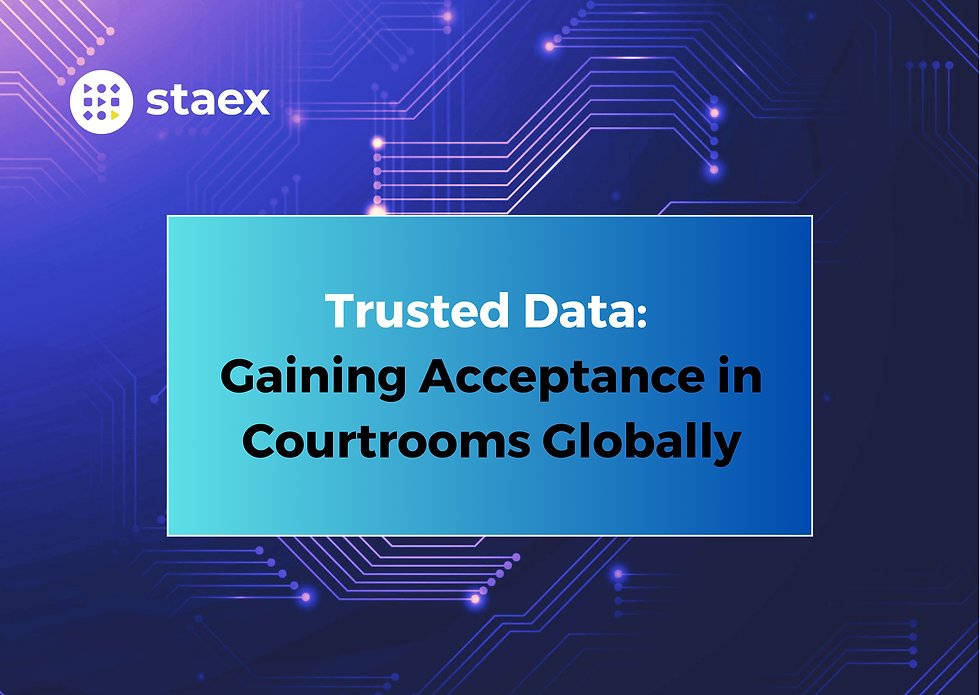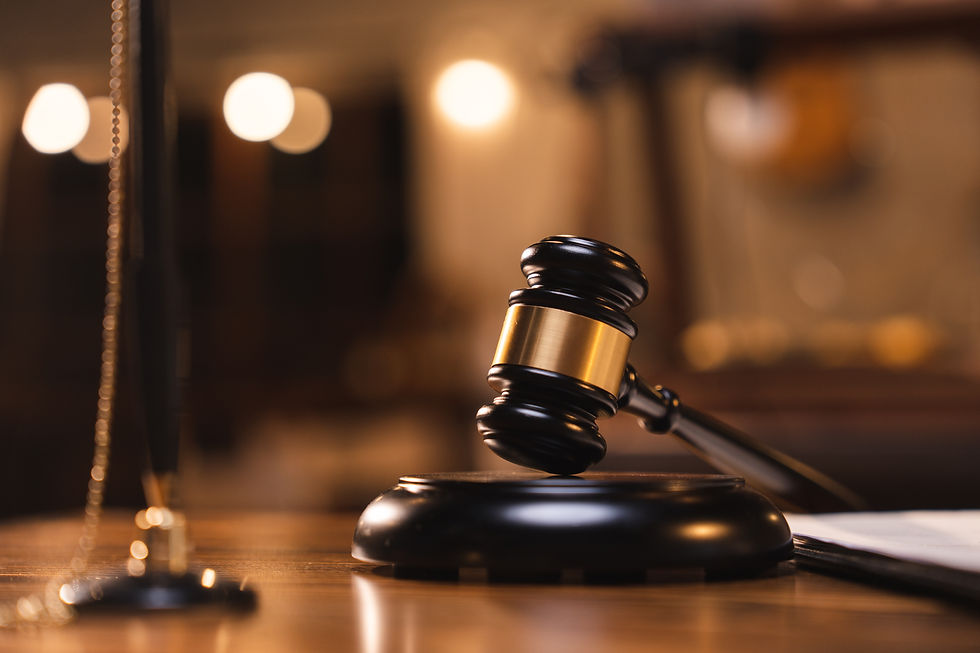Trusted Data: Gaining Acceptance in Courtrooms Globally
- Capy B.

- Aug 13, 2025
- 5 min read
Updated: Aug 19, 2025

In a world where data manipulation and authenticity are concerns, blockchain technology offers an innovative solution: immutability and traceability.
Courts around the world have already recognized blockchain-stored data as valid legal evidence. Here are some examples of how the legal systems are beginning to acknowledge blockchain’s role in establishing trust.

China: Blockchain Evidence Accepted in Court
In 2018, the Hangzhou Internet Court became a global legal pioneer by accepting blockchain-based evidence in a copyright infringement case. The plaintiff had stored screenshots and related web data on a blockchain platform to prove the unauthorized use of their written work. The court concluded that this blockchain evidence met the requirements of:
Authenticity: Because the data was time-stamped via blockchain, its creation time was provable.
Integrity: The immutability of the blockchain ledger meant the evidence had not been tampered with.
This ruling was later reinforced when China’s Supreme People’s Court issued a legal interpretation stating that:
“Data verified using blockchain technology shall be admissible in court if it can demonstrate authenticity, integrity, and relevance to the case.”
Since then, blockchain has been widely used in Chinese courts, especially in internet-related disputes (e.g. e-commerce, digital copyrights). China is leading the world in institutionalizing blockchain as legal evidence. The courts accept blockchain records, especially in intellectual property (IP) and internet disputes, without requiring traditional notarization.
United States: Blockchain Proof in Financial Disputes
The United States state-level courts and legal proceedings have already begun incorporating blockchain records, particularly in cryptocurrency-related disputes and fraud investigations.
Example case:
In 2020, a civil lawsuit concerning a disputed Ethereum transaction relied on blockchain transaction hashes and timestamps to:
Prove who sent the transaction
Verify when it occurred
Confirm that the transaction had not been altered
The court accepted the Ethereum ledger data without questioning its integrity, recognizing its tamper-resistant nature. However, technical experts were called in to explain the transaction logs and metadata for the court to understand them.
Some US states, such as Vermont, Arizona, and Illinois, have passed legislation recognizing blockchain records as "presumptively authentic", meaning they are presumed to be accurate unless proven otherwise. US courts will admit blockchain evidence if it is supported by technical documentation or expert testimony. Several states are paving the way with pro-blockchain statutes that enhance legal clarity.
Italy: Blockchain for Intellectual Property Protection (IPP)
Italy has emerged as a progressive voice in the legal use of blockchain for copyright and design protection. In 2019, following the introduction of a legal decree (Decreto Semplificazioni), Italy formally recognized that:
"Documents recorded via blockchain can have the same legal validity as electronic time stamps, provided they meet technical standards."
Notable case:
A designer used blockchain technology to timestamp the original fashion sketches and designs. When the design was later copied and disputed in court, the blockchain record was submitted as evidence of first authorship.
The judge accepted the blockchain entry because:
The timestamp showed clear precedence.
The data had not been altered since being recorded on-chain.
It eliminated the need for formal copyright registration or notarization.
Italy’s legal framework allows creators to rely on blockchain to establish ownership and creation dates. This is especially valuable in industries like fashion, design, music, and content creation.
France: Recognizing Blockchain as Proof of Creation
France has recently taken a major step in acknowledging blockchain's legal value, especially in the field of intellectual property and copyright law.
Landmark Case (2025):
In March 2025, the Marseille Court recognized blockchain timestamps as legal evidence in a dispute over design authorship between the fashion brand AZ Factory and a third-party brand.
AZ Factory had registered their designs on a public blockchain in May and September 2021.
The court ruled that these timestamps were sufficient to establish priority and originality, noting that blockchain offered a reliable, tamper-proof method for proving the date of creation.
The opposing party’s claims of ownership, which were not backed by any timestamped proof, were dismissed.
This ruling confirms the legal reliability of blockchain for timestamping and may soon influence broader European jurisprudence. French courts now consider blockchain a valid method of proving authorship and creation date, especially when no prior formal registration exists.
United Kingdom: Serving Legal Documents via Blockchain (NFTs)
The UK is experimenting with blockchain in legal procedure, particularly in the context of crypto asset-related disputes.A non-fungible token (NFT) is a unique digital asset that represents ownership of a specific item or piece of content.
Groundbreaking Case: Osbourne v. Persons Unknown (2022)
In this High Court case, a plaintiff needed to serve court papers to a defendant whose identity was unknown except for their crypto wallet address.
The judge permitted service of the lawsuit via an NFT airdrop to the defendant’s Ethereum wallet.
The NFT contained a link to court documents, along with a notice of legal proceedings.
This move ensured that legal documents reached the intended party, via the blockchain, despite their anonymity.
Other common uses in the UK include blockchain as part of digital identity management and chain of title for property transactions (via pilot programs). UK courts are embracing blockchain not just for evidence, but also as a secure delivery mechanism in legal procedures, especially in decentralized contexts.
Germany: Open to Blockchain Evidence
Germany’s legal approach is cautious but catching up. The country has a strong tradition of formal legal procedures and high standards for admissible evidence. However, German courts have not ruled out the use of blockchain, provided it is accompanied by expert validation.
Notable Case: LG Berlin 63 S 107/19
In this 2019 case, the Berlin Regional Court was asked to accept blockchain data as proof of a contractual agreement. The plaintiff submitted a record of the agreement stored on a blockchain.
The court declined to accept the blockchain data on its own, citing the need for additional expert verification or supporting documents.
The blockchain record lacked context and interpretation, which made it difficult for non-technical legal professionals to evaluate it fully.
Still, Germany follows the principle of technological neutrality in law. This means that digital evidence is not dismissed solely based on the medium (such as blockchain) as long as its authenticity and integrity can be proven. Therefore, it is critical for companies to work with experts such as Staex GmbH to sign data on devices and secure it on-chain in a way that is both certified and understandable to a non-technical audience.
In Germany, blockchain data is admissible only when supported by expert interpretation, and it is not yet considered sufficient standalone evidence in most cases.
What Does This Mean?
The recognition of blockchain data in courts is solidifying verifiable digital trust. It clearly demonstrates that immutable records can offer not just technical, but legal reliability. For businesses, creators, and legal professionals, this opens up opportunities for using blockchain to:
Prove ownership
Secure transactions
Prevent data tampering
Simplify cross-border legal processes
As regulatory frameworks evolve, blockchain’s role in legal proceedings will likely become more standardized and even expected.
Contact us for more information:
Staex GmbH
Paksy Plackis-Cheng
Chief Strategy Officer & Co-Founder
TG: PaksyPC



Comments